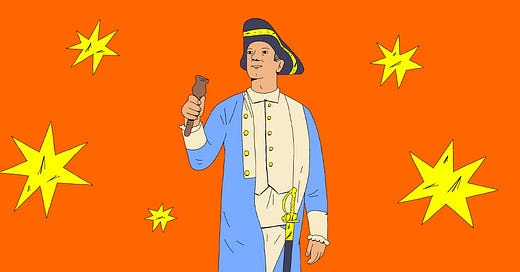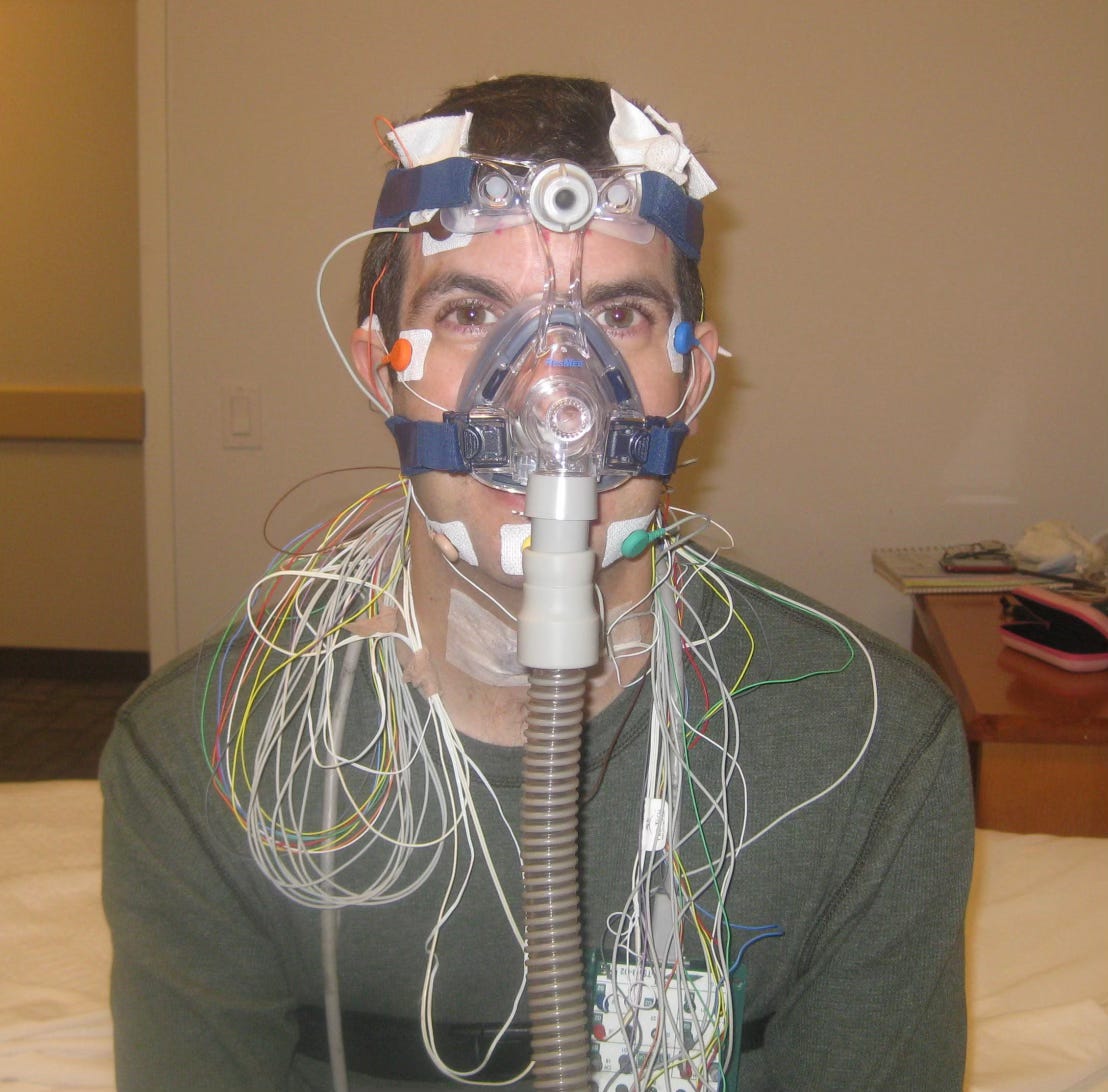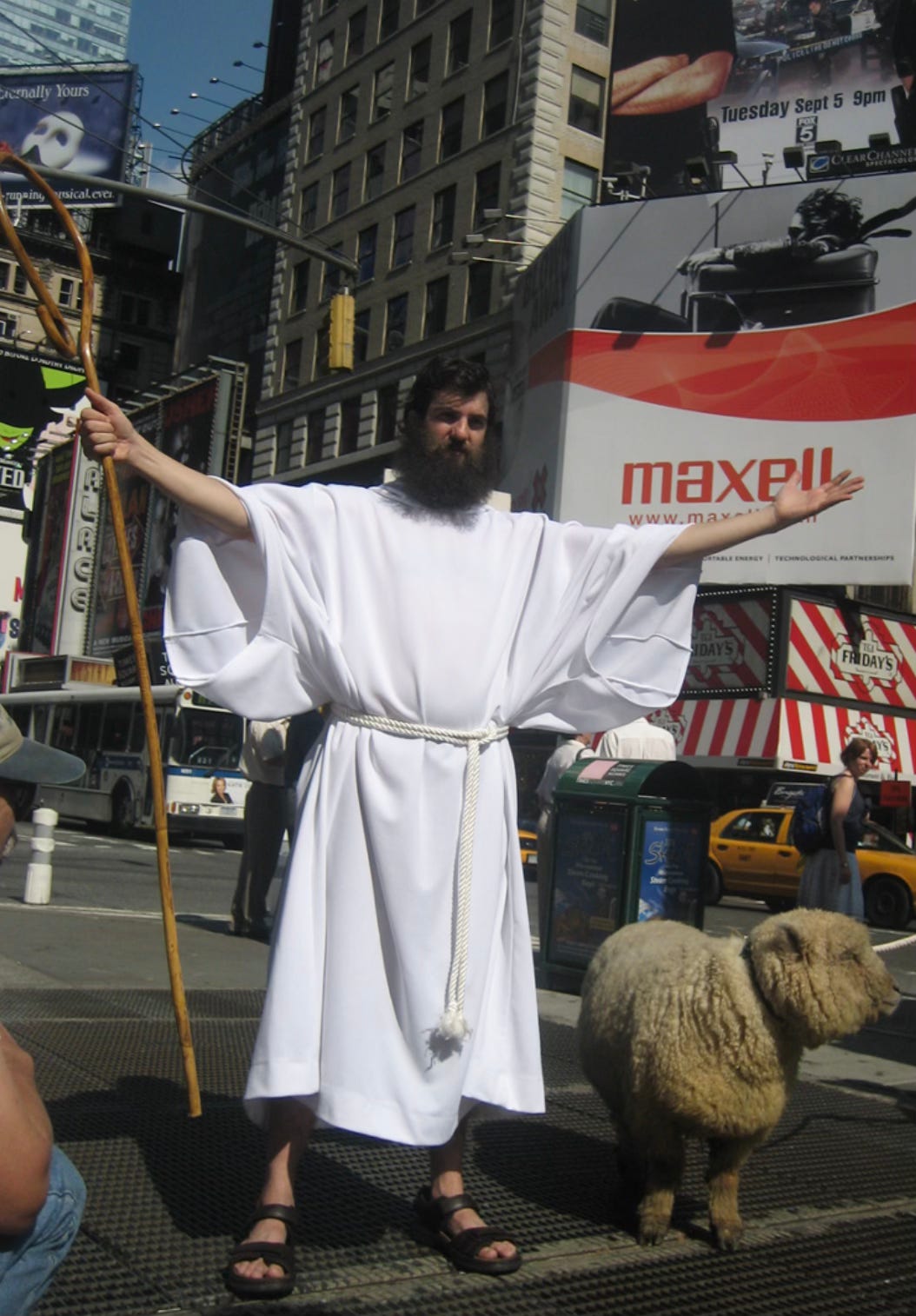“I’m curious about everything.” — A.J. Jacobs
One moment, he’s rattling off obscure facts from the Encyclopedia Britannica. The next, he’s the picture of a health fanatic, meticulously following every wellness trend. And just last year, you might have spotted him in a New York City Starbucks, wearing a tricorn hat and casually wielding an 18th-century musket. In other words, you’d definitely do a double take.
A.J. Jacobs calls himself a human guinea pig. He has dedicated his life to one eccentric quest after another. And while he is undoubtedly passionate, his passion isn’t confined to a single, all-consuming focus. Instead, Jacobs embodies a different philosophy: that passion can be found in the quest itself. Through his eclectic, immersive life experiments, he demonstrates that fulfillment doesn’t always come from discovering a fixed, singular purpose. For some, it’s about cultivating a love for the process of exploration, learning, and growth.
“The way I like to understand and learn topics is to immerse myself in them,” he says. “Just dive in headfirst and live my topic, see what works, see what doesn’t, and hopefully come out the other end a better person… even if it was a mix of pleasant and unpleasant while I was doing it.”
Jacobs says he was born with an insatiable curiosity, a trait I’ve noticed in most of the dozens of passionate people I’ve interviewed for On Fire. “I may not be the smartest, best looking, or most athletic.” he tells me in our interview. “But I do have a high level of curiosity. And I feel very lucky about that because I think it’s a great drive.”
Another thing Jacobs was born with — or perhaps has honed over years of quirky adventures — is the ability to make people laugh. I’m pretty sure I laughed during our entire interview, and even now, writing this from my local coffee shop, I can’t stop laughing out loud.
“I once interviewed Alex Trebek from Jeopardy,” he says. “He said, ‘I’m curious about everything, even those things that don’t interest me.’ Which is sort of a weird paradoxical statement, but I totally get it. I’m curious about everything.”
Jacobs’s quirky humor and love for storytelling trace back to his childhood. He insists that as a kid, he was nerdy — “and not like the fake nerdy, like cool people say they were nerdy. I was genuinely nerdy.”
He always loved to read and write, drawing inspiration from one of his heroes, George Plimpton, a writer famous for his “participatory journalism.” Plimpton immersed himself in various roles — from a professional football player to a top-level bridge player and an ice hockey goalie — then wrote about his experiences from the point of view of an amateur.
“I always thought it was very interesting to read,” Jacobs recalls. “What is it like for a regular person to be in these extraordinary circumstances?”
Inspired by Plimpton’s willingness to dive into new, uncomfortable experiences and learn by doing, Jacobs decided to take a similar approach in his own work. One of his first official quests came while he was working at Entertainment Weekly in the mid-90s. At the time, everyone told him he looked remarkably like Noah Taylor, the actor who had just portrayed a brilliant pianist in the critically acclaimed movie Shine.
“He and I had the same look,” Jacobs says. “We had the same unfortunate haircut, which was sort of, I don’t know, a page boy or something. And very thick, black, clunky glasses.”
When his co-workers found out that Taylor wasn’t going to go to the Oscars, they suggested Jacobs go and pretend to be him — to see what it’s like to be a movie star for a night.
Jacobs, always up for an adventure, decided to play along. With his press ticket in hand, he attended the event and let people assume he was Taylor. Though he never explicitly claimed to be the actor, everyone assumed he was due to their uncanny resemblance. People approached him nonstop to tell him what a genius he was. “It was really quite awesome because I had never had that much positive feedback,” he says, laughing. “Which I knew wasn’t for me. But it’s very hard to separate when you’re being lavished with praise nonstop for five hours.” After the experience, he wrote an article for the magazine about the surreal experience of being a celebrity.
However flattering the praise was, playing an actor for a night didn’t make Jacobs want to pursue acting. But the experience of immersing himself in a new world reinforced what Jacobs had long admired in Plimpton’s work: the power of stepping into a new role — or going on a quest — to gain unique perspectives. More captivated by the journey than ever, he soon embarked on even bigger quests, starting with his ambitious project to read the entire Encyclopedia Britannica and learn everything in the world.
“As a kid, my dad started to read the Encyclopedia,” he recalls. “He loves reading, and he loves learning. And he didn’t finish. He made it to the letter ‘B,’ like Bolivia… and he gave up.”
That unfinished task planted the seed for Jacobs’ first big quest: “What if I tried to finish what he began? You know, to restore honor to our family name.”
It took him a little over a year to read the entire Encyclopedia Brittanica. Along the way, he learned some of the most fascinating, bizarre things. “Like, opossums have 13 nipples,” he recounts. “That just stuck in my brain, and it’ll never get out.” What.
As he absorbed these unusual facts, he also took notes on his life. What followed was his first book, The Know-It-All: One Man’s Humble Quest to Become the Smartest Person in the World. Part memoir, part Cliff’s Notes to every topic under the sun, it marked Jacobs’ first foray into what would become his signature style: immersing himself in something he’s curious about and then documenting the experiences through his writing.
Since then, Jacobs’s quests have spanned a wide range of topics: from following the Bible as literally as possible for a year (The Year of Living Biblically: One Man’s Humble Quest to Follow the Bible as Literally as Possible); to spending two years trying to become the healthiest person alive (Drop Dead Healthy: One Man’s Humble Quest for Bodily Perfection); to exploring the enduring power of puzzles (The Puzzler: One Man’s Quest to Solve the Most Baffling Puzzles Ever, from Crosswords to Jigsaws to the Meaning of Life); to spending a year thanking everyone involved in producing his morning cup of coffee (Thanks a Thousand: A Gratitude Journey from Bean to Cup).
Most recently, Jacobs spent a year trying to live as closely as possible to the original meaning of the Constitution (The Year of Living Constitutionally: One Man’s Humble Quest to Follow the Constitution’s Original Meaning). He became especially interested in it in the wake of several controversial rulings by the Supreme Court and the on-going debate about how the constitution should be interpreted. Ever curious, he set out to understand what it means to take the Constitution literally.
“I thought, well, what does that mean [to live by the Constitution]?” he says. “Let me actually try to get in the minds of the Founding Fathers.” He soon embarked on a quest to follow the original meaning of the Constitution as literally as possible — which meant everything from boiling mutton and carrying an 18th century musket on the streets of New York to wearing a tricorne hat, which, halfway through our interview, he retrieved and wore for the rest of our conversation.
What do all of Jacobs’s quests have in common? His insatiable curiosity and his focus on the journey of becoming — rather than the end result or even the specific passion (like the Constitution). In fact, his approach reminds me of one of my favorite books: Range: Why Generalists Triumph in a Specialized World by David Epstein. In Range, Epstein explains how having a wide range of experiences and exploring different interests can lead to more innovation and fulfillment than focusing narrowly on one thing. Jacobs’s diverse quests are a perfect example of this. They show us that passion doesn’t always come from sticking to a single path.
But curiosity is just the spark. Jacobs has learned that it’s taking action — whether stepping into the role of a movie star or following the Constitution’s literal interpretation — that truly shapes how we think and who we become. “It is easier to act yourself into a new way of thinking, than it is to think yourself into a new way of acting,” the saying goes — though its origins are unclear, with attributions ranging from a 19th-century minister to Millard Fuller, the co-founder of the Habitat for Humanity.
“If you act ‘as if’ you’re a good person, you start to believe you are a good person,” Jacobs insists. “I found this to be so powerful because anytime I do an experiment and act a certain way, it starts to affect me. So even if I’m not healthy, but I start to act as if I’m healthy, or if I’m not grateful, but I act as if I’m grateful and thank everyone, it really affects my mind.”
I love this, and I tell him so. It aligns perfectly with the fitness philosophy I’ve developed over the years. On a mission to help everyone discover their inner athlete, I encourage people to start by doing what athletes do — setting meaningful goals, treating workouts as support for the life they love, and seeing food as fuel for their endeavors. Over time, with enough small actions, people’s identities begin to shift from non-athlete to athlete (or at least from non-fit to fit). This is how I built my own athletic identity — one micro-goal and step at a time.
So, how can we all begin our own passionate quests, even if without a specific passion to build around? I ask the quest evangelist himself.
“This is my job, so I can devote a year to it,” he says. But he insists that anyone can benefit from smaller quests without quitting their jobs or committing full-time. The key, he advises, is to start small and avoid getting overwhelmed.
I couldn’t agree more. After 15 years in the fitness industry, I’ve seen it time and time again: nothing predicts failure more than starting too big. Small, manageable goals help integrate new habits into our lives and make it more likely they’ll become part of our identity.
“Choose a small thing that interests you,” Jacobs suggests. “Like, ‘I’m going to write a journal by hand, and I promise to write three sentences a day, and I promise to do it for a week.’ Once you get the momentum, there’s a bigger chance you’ll continue. So make your goal very specific, and make it small and manageable, and then build up from there.”
In a world where we’re often told to “enjoy the journey,” Jacobs offers a practical, inspiring blueprint for how to truly do that — by embracing the quest, with all its unexpected twists and turns, as the fire that fuels our passion.
Takeaways
Here is one big thing I learned this week about passion, one exercise you can do to stoke your own inner fire, and one aspect of Jacobs’s intense enthusiasm that rubbed off on me — and that I now want to learn more about, too!
1. One Lesson: Passion is in the Quest
A.J. Jacobs's life experiments show that passion doesn’t always stem from one fixed pursuit. Instead, it can about cultivating a love for the quest itself — the process of exploration, learning, and becoming. Whether it’s reading the entire Encyclopedia Britannica or living by the Constitution, Jacobs’s philosophy suggests that our fulfillment can come from embracing the journey, even when it’s messy or unexpected. The key takeaway? Passion doesn’t need to be confined to one all-consuming focus—it can emerge from the act of constantly seeking new experiences and challenges.
2. One Exercise: Develop a Daily "Curiosity Time"
Jacobs starts his day by taking time to brainstorm quest ideas—a habit that fuels his creativity. He devotes 10-15 minutes in the morning to jotting down ideas, whether they're usable or not. For your own quest-fueled life, try setting aside time each day to explore your curiosities. Write down anything that sparks your interest, no matter how small or impractical it seems. By consistently generating ideas, you might stumble upon something that excites you enough to turn into your next adventure.
3. One Curiosity: Reading about Quests
Talking to Jacobs made me realize I’ve been on a mini quest of my own this past year: to read as many quest-driven books as possible while writing my own! So far, I’ve explored everything from a quest to master poker (The Biggest Bluff by Maria Konnikova), to biking across South America (To Shake the Sleeping Self by Jedidiah Jenkins), and of course, many of Jacobs’s own immersive adventures. I love seeing how these authors embrace their journeys and the lessons they discover along the way. What quest-based books should be next on my list?









This is a good one, Krista. Love this guy.